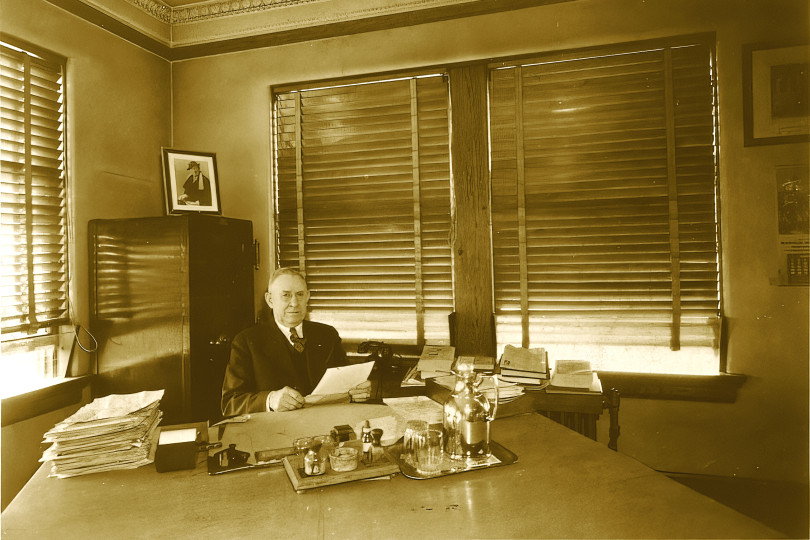Joseph Franklin’s 36-year tenure as International President (1908-1944) stands as a demonstration of unwavering leadership during some of the most turbulent periods in United States history. From the Great Depression to wartime chaos, Franklin’s leadership was characterized by resilience, adaptability and an unyielding commitment to the union and its members.
When members voted for Franklin as president in 1908, the Brotherhood was facing existential threats. Membership and income had plummeted to the point where many doubted the union’s survival. Yet, under his leadership, the Brotherhood not only survived but thrived, weathering economic downturns, wars and shifting industries. His tenure saw the Brotherhood’s transformation from a primarily railroad union to a shipbuilders’ union during WWI, back to a railroad union in the interwar years, and again to shipbuilding during WWII.
Born in 1868, Franklin’s early life was marked by hardship. His father died when Franklin was only six years old, and his formal education was brief. He entered the boilermaker trade in 1892. Seven years later, he joined the Boilermakers, becoming one of the charter members of Local 221 in Pittsburg, Kansas. His rise to the highest office was swift. By 1906, he was elected first International Vice President, and just two years later, members elected him International President.
Franklin’s leadership style was shaped by his own experiences as a young man who’d been blacklisted for union activities. This experience instilled in him an intense determination to protect and advance the union and defend the working class. His efforts to improve conditions for Boilermakers extended beyond the union. In 1908, he was a key figure in founding the Railroad Employees Department, and in 1912, he co-founded the Federations of Railway Employees, which later became part of the AFL’s Railway Employees Department.
Franklin’s influence also reached the highest levels of government. In 1918, President Woodrow Wilson appointed him assistant director of labor for the United States Railroad Administration. This role, which he held until the agency’s dissolution in 1920, demonstrated his ability to navigate both labor and management.
One of Franklin’s most significant contributions was his focus on ensuring the union’s financial stability. In 1914, he convinced convention delegates to establish a fund to purchase a headquarters building. Four years later, he was instrumental in founding the Brotherhood Bank, where he served as the first board chairman. These institutions proved crucial during the Great Depression, when membership shrank, and many banks failed.
His commitment to the Boilermakers earned him the unwavering loyalty of members, and his steadfast commitment to organizing and recruiting kept the union solvent and thriving throughout many turbulent years.
Franklin passed away in Kansas City on Feb. 18, 1948, at the age of 79. His legacy as a leader who never compromised his principles remains today. His successor, Charles MacGowan, eulogized him as “a man, rugged and wholesome but noble and lovable. The dominant urge in his whole being was to render a full measure of service to the cause in which he had dedicated even life itself.”






